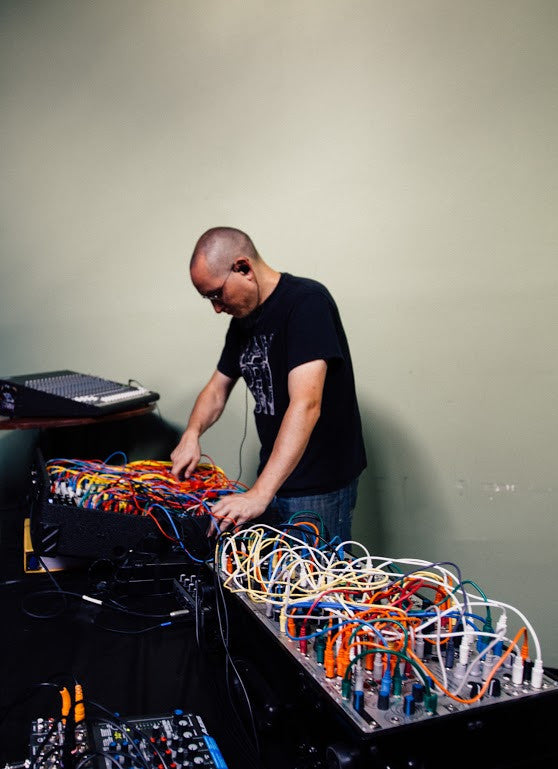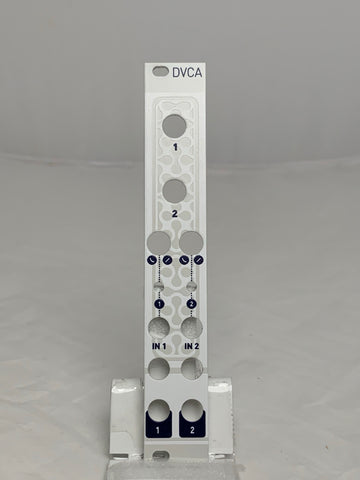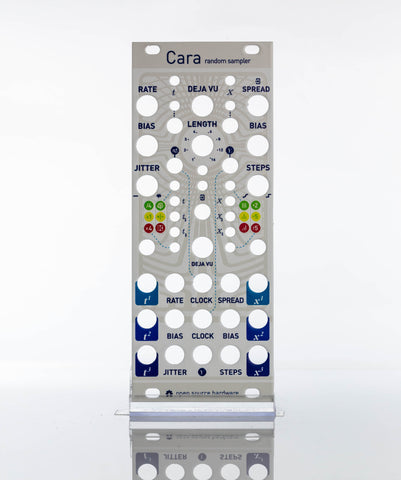While most music fans have become accustomed to seeing music performed behind the subtle glow of a computer monitor, there is a growing community of electronic musicians who are breaking away from the sterility of laptops and embracing the basics of hardware synthesis again. Musicians in search of a broader palette of sounds with more character and life. The new renaissance of synthesizers, most notably in Eurorack format, is growing by leaps and bounds as more users are discovering the expansive and seemingly limitless nature of this interface.
Twenty years ago the idea of building a studio arsenal of great sounding synthesizers was viewed as an incredibly exclusive, expensive and downright overwhelming task. Those days are over.Now you can conceptualize and create your own customized instrument by selecting each individual element, whether they be oscillators, filter or effects, for use in an instrument tooled to the users exact tastes. The artist is no longer restricted to a prepackaged, template locked into an overpriced shell. There are seemingly limitless streams of high quality, sophisticated designs emerging from manufacturers and boutique builders all over the world. The possibilities are endless. The only real limitations for the users are “how much space do you have in your case?” and “how much you are willing to spend?”.

The current hotbed of modular synth activity in the United States is Portland, Oregon. Although it very much identifies as an indie rock town, this city is home to a slew of electronics companies, building both stompboxes and synthesizers, that derive as much inspiration from the early synth pioneers of the 80's and the industrial noise of the 90's as they do from the rock icons of the 70's. This confluence of styles has culminated into a very eclectic mix of performer,builders, and experimenters that form the makeup of a very unique, exciting musical scene.
At the nexus point of this Portland synth movement is the Muff Wiggler store (RIP). A sleepy minimalistic boutique houses a single wall of synthesizers and Eurorack demo rigs. Behind this humble facade lies a sleeping giant, DarkPlace Manufacturing. This warehouse is a sort of 'testing ground' for new ideas and innovation whilst also being the manufacturing hub for a number of heavy hitters like Malekko Heavy Industry, The Harvestman, Sputnik, 4ms, and Roland.

Malekko in particular is the linchpin that holds all the pieces together. Co-owner Josh Holley has been a key figure in driving the modular movement since 2008 and continues to this day. The interesting fact is it all came about by happenstance. The Malekko name originally belonged to a music project born in Austin, Texas in the early 2000's. Holley, Paul Barker (of Ministry fame) and a few others, were working together, tinkering with samples, synths, and whatever gear they could get their hands, but something quite unexpected emerged from this collaboration.
When we spoke recently in his home office, Holley replied,“Paul had a secret weapon in Ministry, the Maestro Brassmaster. He wanted to retire it, so me and my dad {an electrical engineer}reverse engineered his and I made two of them. So we made a pink triangle version and called it the Barker Assmaster.”
"It accidentally became a company,” Holley joked. The clone took on a life of its own and the demand became too powerful to ignore. Alas, Malekko Heavy Industries was born. "As long as we are a company we will continue making that pedal” he added. But Holley wouldn't be satisfied simply making guitar effects forever, so it gradually matured into the building of synthesizers and Eurorack modules. By his own admission, it was only dumb luck that they happened to choose a format on the precipice of an explosion. They eventually moved the operation to Portland in 2010 and the rest is history.
Initially the idea was to recreate the classic sounds of the past. Getting a hold of a Buchla, Prophet 6, or an Arp Odyssey is often unrealistic for the average musician, but Eurorack has changed the paradigm.
“When modular synthesizers starting becoming available, people were looking backwards...what were classic sounds? A lot of younger people who weren't exposed to classic sounds are creating modules now and they are looking forward.”
Analog synthesizers have come back in a big way. Giants like Korg and Roland are fully on board with the Eurorack trend and this year promises to be a benchmark for new introductions. One collaboration between Malekko and Roland making serious waves at this moment is the System 500. A reference to the past with an eye towards the future, it has all the glorious capabilities of the vintage Roland system 100m and system 700. The oscillators sound incredible, the filters are immediately recognizable and it tracks exceptionally well. Both Roland and Malekko are known for quality and it is on full display in these units. More than simply a collection of modules, it is a beautifully crafted instrument. Given the excitement generated over this introduction, you can be sure there will be more to come in the future. The road paved by these smaller, boutique builders has opened the floodgates and now everyone is riding the waves.“In 2008 all 7 Eurorack manufacturers were in the basement, now they are all grouped together in Hall C and have basically taken over a giant portion of the largest music trade show in the world.” Holley quips. That certainly says a lot about the viability of this market.
The momentum of the designers and builders has had a contagious effect on the local Portland music scene as well. “Portland has always been kind of a synth town. It has always been a creative town where people are gonna get some inexpensive gear and create art with it” Josh explains. Muff Wiggler hosts regular swap meets where local gear nerds can come and shop wares, try out new things, and exchange information with one another. There is an atmosphere of community amongst the creative people here who are making products and playing shows. This creative energy feeds into itself and furthers the progression of the artform.

One great example being the Experimental Electronic Music Collective Performance dubbed 'Volt Divers'. This monthly showcase (held at prominent goth bar Lovecraft) is a vehicle for musicians who share a common bond. All the artists bring something stylistically unique to the table with the one common thread being the admiration of electronic hardware. Industrial Noise, ambient, dance music, all are represented.As Holley points out,“Wonderful musicians who have crafted music solely for the purpose of making music again.” Ultimately this is the purpose of the craft. Artists making beautiful sounds that are inspired by and conversely admired by peers. It's a tremendous exchange that will most certainly yield exciting results for the future of our new musical landscape.
**(content originally appeared on Reverb.com by Magpie Modular's own Chad Bartel but we decided to include the unedited version with pics from Kris)





